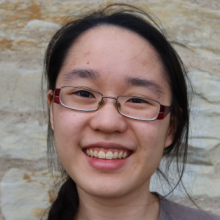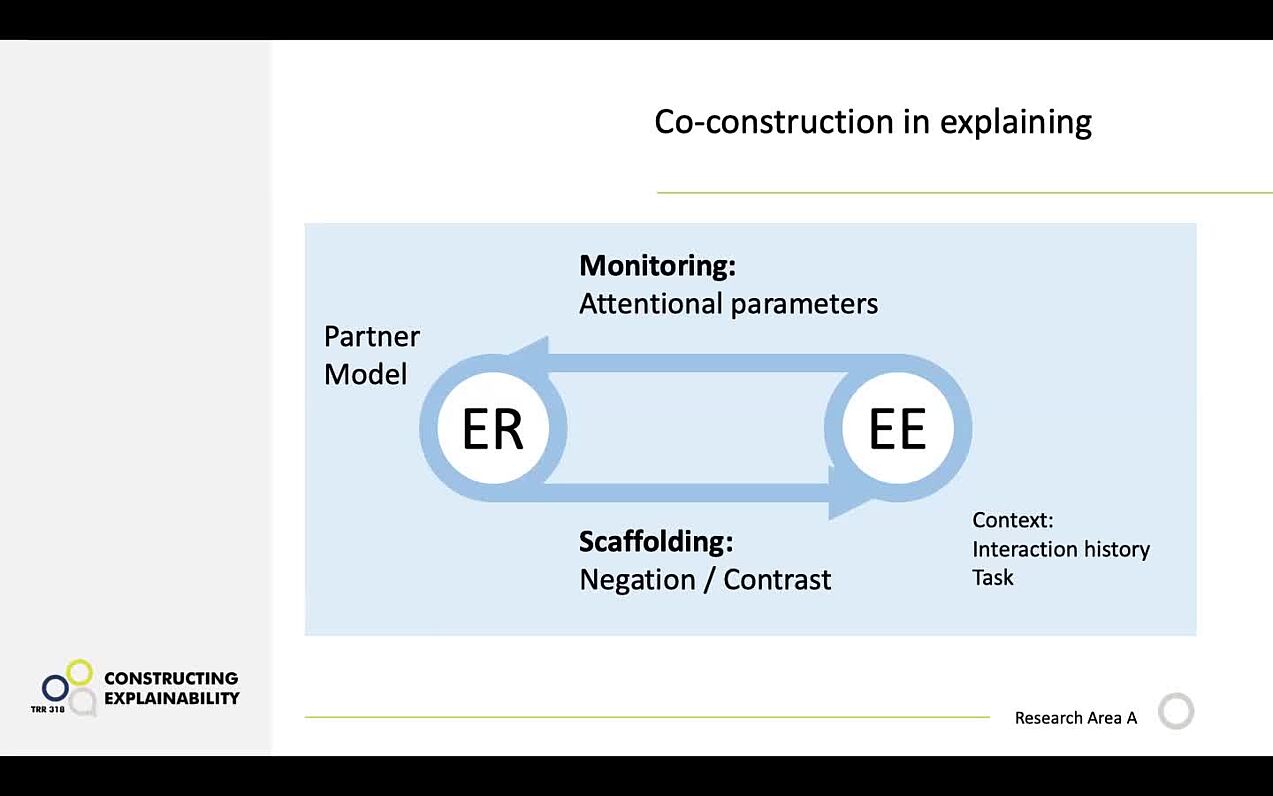Project A05: Contextualized and online parametrization of attention in human–robot explanatory dialog

In Project A05, researchers from the areas of linguistics, psychology, and computer science are investigating attention in human-robot explanatory dialog. They are addressing questions including: where do humans focus their attention when a robot explains a task to them? How can robots direct their counterpart’s attention to achieve the goal of the task? What influence does it have on overall understanding? To investigate these questions, the researchers are assessing attention during an interactive human robot explanatory dialog. The researchers are also aiming to investigate the conditions under which certain linguistic formulations, such as “do X and not Y”, might influence the nature of explanation and understanding. Based on these results, the researchers will then draw conclusions about how robots can understand and direct the attention of their human counterparts and subsequently generate interpretable explanations.
Research areas: Linguistics, Psychology, Computer science
Associate member
Dr.-Ing. Birte Richter, Bielefeld University
Posters
Conference-Poster presented at 4th Summer School on Social Human-Robot Interaction with the title "Interactive Contrast: Does conversational contrast affects action understanding?" by Amit Singh and Katharina J. Rohlfing.
Conference-Poster presented at 9th Experimental Pragmatics Conference with the title "Negation processing in action: How action path is interpreted in a negated context?" by Amit Singh and Katharina J. Rohlfing.
Publications
What is Missing in XAI So Far?
U. Schmid, B. Wrede, KI - Künstliche Intelligenz 36 (2022) 303–315.
Which “motionese” parameters change with children's age? Disentangling attention-getting from action-structuring modifications
K. Rohlfing, A.-L. Vollmer, J. Fritsch, B. Wrede, Frontiers in Communication 7 (2022).
An Architecture Supporting Configurable Autonomous Multimodal Joint-Attention-Therapy for Various Robotic Systems
A. Groß, C. Schütze, B. Wrede, B. Richter, in: INTERNATIONAL CONFERENCE ON MULTIMODAL INTERACTION, ACM, 2022, pp. 154–159.
Enabling Non-Technical Domain Experts to Create Robot-Assisted Therapeutic Scenarios via Visual Programming
C. Schütze, A. Groß, B. Wrede, B. Richter, in: INTERNATIONAL CONFERENCE ON MULTIMODAL INTERACTION, ACM, 2022, pp. 166–170.
Effects of verbal negation on TVA’s capacity and weight parameters
N.C. Banh, I. Scharlau, in: S. Malejka, M. Barth, H. Haider, C. Stahl (Eds.), TeaP 2022 - Abstracts of the 64th Conference of Experimental Psychologists , Pabst Science Publishers, 2022.
Folgen wiederholter Negation auf die Aufmerksamkeit
N.C. Banh, I. Scharlau, K.J. Rohlfing, in: C. Bermeitinger, W. Greve (Eds.), 52. Kongress Der Deutschen Gesellschaft Für Psychologie, 2022.
Exploring Monological and Dialogical Phases in Naturally Occurring Explanations
J.B. Fisher, V. Lohmer, F. Kern, W. Barthlen, S. Gaus, K. Rohlfing, KI - Künstliche Intelligenz 36 (2022) 317–326.
RISE: an open-source architecture for interdisciplinary and reproducible human–robot interaction research
A. Groß, C. Schütze, M. Brandt, B. Wrede, B. Richter, Frontiers in Robotics and AI 10 (2023).
EEG Correlates of Distractions and Hesitations in Human–Robot Interaction: A LabLinking Pilot Study
B. Richter, F. Putze, G. Ivucic, M. Brandt, C. Schütze, R. Reisenhofer, B. Wrede, T. Schultz, Multimodal Technologies and Interaction 7 (2023).
First steps towards real-time assessment of attentional weights and capacity according to TVA
N.C. Banh, I. Scharlau, in: S. Merz, C. Frings, B. Leuchtenberg, B. Moeller, S. Mueller, R. Neumann, B. Pastötter, L. Pingen, G. Schui (Eds.), Abstracts of the 65th TeaP, ZPID (Leibniz Institute for Psychology), 2023.
Scaffolding the human partner by contrastive guidance in an explanatory human-robot dialogue
A. Groß, A. Singh, N.C. Banh, B. Richter, I. Scharlau, K.J. Rohlfing, B. Wrede, Frontiers in Robotics and AI 10 (2023).
Contrastiveness in the context of action demonstration: an eye-tracking study on its effects on action perception and action recall
A. Singh, K.J. Rohlfing, in: Proceedings of the Annual Meeting of the Cognitive Science Society 45 (45), Cognitive Science Society, Sydney, Australia, 2023.
Coupling of Task and Partner Model: Investigating the Intra-Individual Variability in Gaze during Human–Robot Explanatory Dialogue
A. Singh, K.J. Rohlfing, in: Proceedings of 26th ACM International Conference on Multimodal Interaction (ICMI 2024), 2024.
Benefiting from Binary Negations? Verbal Negations Decrease Visual Attention and Balance Its Distribution
N.C. Banh, J. Tünnermann, K.J. Rohlfing, I. Scharlau, Frontiers in Psychology 15 (2024).
Show all publications







